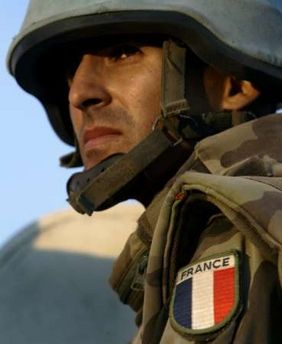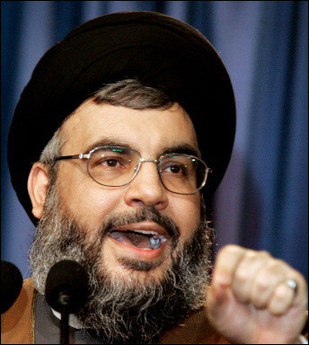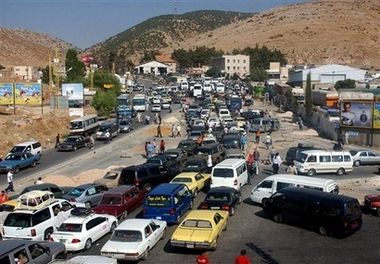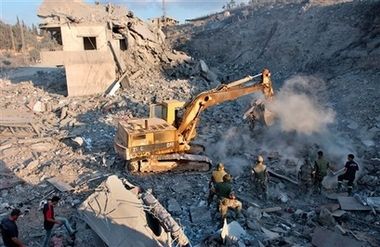 JERUSALEM (Reuters)- Israel will not demand the immediate disarming of Hizbollah as part of a deal to end the fighting in Lebanon, a senior Israeli official said on Saturday. Israel's position could make it easier to reach agreement with Western powers and the Lebanese government on the proposed deployment of a peacekeeping force in Lebanon. Hizbollah would almost certainly reject a force whose mandate called for its disarmament.
JERUSALEM (Reuters)- Israel will not demand the immediate disarming of Hizbollah as part of a deal to end the fighting in Lebanon, a senior Israeli official said on Saturday. Israel's position could make it easier to reach agreement with Western powers and the Lebanese government on the proposed deployment of a peacekeeping force in Lebanon. Hizbollah would almost certainly reject a force whose mandate called for its disarmament.
"Disarming Hizbollah will not be part of the mandate for the (peacekeeping) mission for now," a senior Israeli Foreign Ministry official, speaking on condition of anonymity, told Reuters. "However it is supposed to strengthen the Lebanese army, the responsibility of which will be to implement UN security council.
Foreign Ministry spokesman Mark Regev said Israel saw the full implementation of resolution 1559 as "the only real way to solve the problem in Lebanon."Asked if Israel was demanding Hizbollah's immediate disarmament, Regev said: "Hizbollah has to be disarmed as soon as possible."France has emerged as the potential leader of a multinational force but has ruled out deployment until a ceasefire and political agreement have been reached, Western diplomats say.
 BEIRUT, Lebanon - Hezbollah's leader on Saturday threatened more attacks on central Israeli cities, a day after guerrillas for the first time fired a rocket powerful enough to reach the outskirts of Tel Aviv. Sheik Hassan Nasrallah, speaking on Hezbollah's TV station, said he supported Lebanon's efforts to negotiate a peace deal, but suggested tentative promises for the guerrillas to disarm would be off if conditions aren't met.Israel has not made a "single military accomplishment" in its offensive on Lebanon, he said, speaking on the group's Al-Manar television.
BEIRUT, Lebanon - Hezbollah's leader on Saturday threatened more attacks on central Israeli cities, a day after guerrillas for the first time fired a rocket powerful enough to reach the outskirts of Tel Aviv. Sheik Hassan Nasrallah, speaking on Hezbollah's TV station, said he supported Lebanon's efforts to negotiate a peace deal, but suggested tentative promises for the guerrillas to disarm would be off if conditions aren't met.Israel has not made a "single military accomplishment" in its offensive on Lebanon, he said, speaking on the group's Al-Manar television.
Nasrallah announced that Israel suffered a "serious defeat" in ground fighting around a Lebanese border town after Israeli troops pulled back Saturday afternoon. Israel said they left Bint Jbail because they accomplished their mission of wearing down Hezbollah fighters after a week of heavy battles.On Friday, a Hezbollah rocket hit outside the Israeli town of Afula, the farthest strike yet. Hezbollah said it targeted an Israeli military base, but the rockets fell in an empty field.
"The bombardment of Afula and its military base is the beginning ..., Nasrallah said. "Many cities in the center (of Israel) will be targeted in the 'beyond Haifa' stage if the savage aggression continues on our country, people and villages."
 BEIRUT, 29 July (IRIN) - Lebanon is facing an environmental crisis after an Israeli air strike on the Jiyeh power station, about 20km south of Beirut caused 10,000 tonnes of oil to spill into the Mediterranean sea. The air strikes on 13 and 15 July hit the power station's fuel tanks and the leaking oil was pushed north by winds, and a thick sludge now coats much of the Lebanese coastline. At least 80km of the 200km coastline is affected. Officials at Lebanon's environment ministry say that the clean-up operation will take at least a year to complete and at an estimated cost of more than US $ 130 million.
BEIRUT, 29 July (IRIN) - Lebanon is facing an environmental crisis after an Israeli air strike on the Jiyeh power station, about 20km south of Beirut caused 10,000 tonnes of oil to spill into the Mediterranean sea. The air strikes on 13 and 15 July hit the power station's fuel tanks and the leaking oil was pushed north by winds, and a thick sludge now coats much of the Lebanese coastline. At least 80km of the 200km coastline is affected. Officials at Lebanon's environment ministry say that the clean-up operation will take at least a year to complete and at an estimated cost of more than US $ 130 million.
"It is about 10,000 tonnes of oil, but because of the security situation we cannot go into the sea to see what the real situation is," said a spokeswoman at the ministry, who requested anonymity. There are fears that more oil could spill into the sea due to a fire at the facility that began on Thursday and now threatens a undamaged tank that contains 15,000 tonnes of oil. The fire at the facility has created a thick cloud of black smoke that has polluted the air over Beirut and its suburbs. Government officials say although the fire poses a environmental hazard in the long-term it is less damaging than a spill into the sea. "It's good in a way because air pollution is the better of the two evils," the spokeswoman said.
 DAY 15, BEIRUT (Reuters) - Israel launched a heavy air and artillery bombardment of south Lebanon on Thursday after nine Israeli soldiers were killed in the Jewish state's worst 24 hours for casualties in a 16-day-old conflict against Hizbollah. Israeli warplanes destroyed communication masts north of Beirut and attacked three trucks carrying medical and food supplies to the east, security sources said. They said two truck drivers were killed. Israel accuses Lebanon's eastern neighbor Syria of supplying Hizbollah guerrillas with weapons.
DAY 15, BEIRUT (Reuters) - Israel launched a heavy air and artillery bombardment of south Lebanon on Thursday after nine Israeli soldiers were killed in the Jewish state's worst 24 hours for casualties in a 16-day-old conflict against Hizbollah. Israeli warplanes destroyed communication masts north of Beirut and attacked three trucks carrying medical and food supplies to the east, security sources said. They said two truck drivers were killed. Israel accuses Lebanon's eastern neighbor Syria of supplying Hizbollah guerrillas with weapons.
Other Israeli aircraft blasted targets in and around several villages and towns in the mainly Shi'ite Muslim south, and artillery batteries opened up from Israel's side of the border.Hizbollah guerrillas killed nine Israeli soldiers in house-to-house fighting in a border town and a nearby village on Wednesday, as senior international diplomats failed at a Rome conference to agree on calling for an immediate ceasefire.
An Israeli general said the offensive, which has killed 433 Lebanese, mostly civilians, would go on "for several more weeks." The fighting began on July 12 when Hizbollah captured two Israeli soldiers and killed eight in a cross-border raid.A total of 51 Israelis have been killed in Hizbollah attacks that have included rockets being fired into northern Israel.Foreign ministers at the Rome conference pledged to work urgently for a "lasting, permanent and sustainable" ceasefire but did not call for the fighting to stop now, as Lebanon and its Arab allies had demanded.
Khazen History


Historical Feature:
Churches and Monasteries of the Khazen family

St. Anthony of Padua Church in Ballouneh
Mar Abda Church in Bakaatit Kanaan
Saint Michael Church in Bkaatouta
Saint Therese Church in Qolayaat
Saint Simeon Stylites (مار سمعان العامودي) Church In Ajaltoun
Virgin Mary Church (سيدة المعونات) in Sheilé
Assumption of Mary Church in Ballouneh
1 - The sword of the Maronite Prince
2 - LES KHAZEN CONSULS DE FRANCE
3 - LES MARONITES & LES KHAZEN
4 - LES MAAN & LES KHAZEN
5 - ORIGINE DE LA FAMILLE
Population Movements to Keserwan - The Khazens and The Maans
ما جاء عن الثورة في المقاطعة الكسروانية
ثورة أهالي كسروان على المشايخ الخوازنة وأسبابها
Origins of the "Prince of Maronite" Title
Growing diversity: the Khazin sheiks and the clergy in the first decades of the 18th century
Historical Members:
Barbar Beik El Khazen [English]
Patriach Toubia Kaiss El Khazen(Biography & Life Part1 Part2) (Arabic)
Patriach Youssef Dargham El Khazen (Cont'd)
Cheikh Bishara Jafal El Khazen
Patriarch Youssef Raji El Khazen
The Martyrs Cheikh Philippe & Cheikh Farid El Khazen
Cheikh Nawfal El Khazen (Consul De France)
Cheikh Hossun El Khazen (Consul De France)
Cheikh Abou-Nawfal El Khazen (Consul De France)
Cheikh Francis Abee Nader & his son Yousef
Cheikh Abou-Kanso El Khazen (Consul De France)
Cheikh Abou Nader El Khazen
Cheikh Chafic El Khazen
Cheikh Keserwan El Khazen
Cheikh Serhal El Khazen [English]
Cheikh Rafiq El Khazen [English]
Cheikh Hanna El Khazen
Cheikha Arzi El Khazen
Marie El Khazen